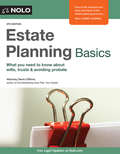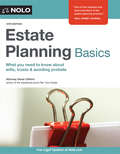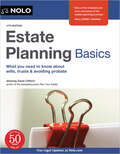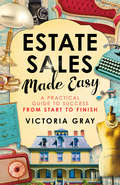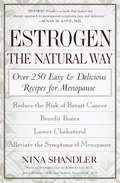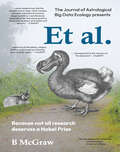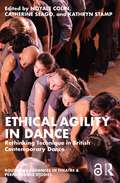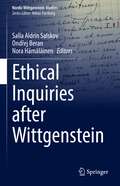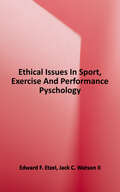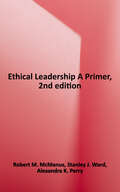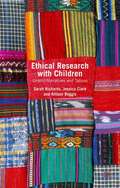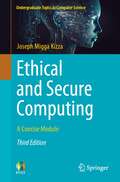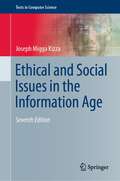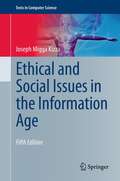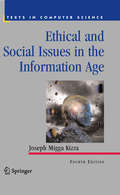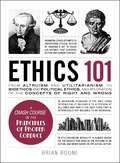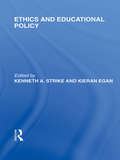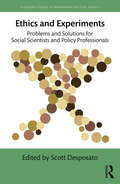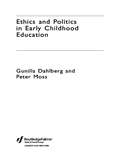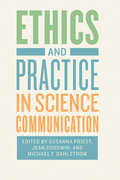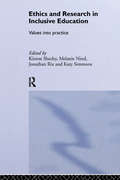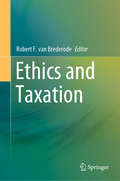- Table View
- List View
Estate Planning Basics
by Denis CliffordThis book provides concise, straightforward, and easy-to-read information about the major components of estate planning – without going into endless detail about arcane options that apply only to the wealthy. Topics include: choosing beneficiaries estate planning by parents with minor children wills living trusts avoiding probate trusts for people in a second marriage, and planning for incapacity. Best-selling Nolo author Denis Clifford uses plain-English to make these estate planning issues easy to understand, and he lets you know which tasks you can handle yourself, and when you’ll need a lawyer’s help.
Estate Planning Basics
by Denis CliffordEstate planning, in plain English This book provides concise, straight forward, and easy to read information about the major components of estate planning – without going into endless detail about arcane options that apply only to the wealthy. Topics include: choosing beneficiaries estate planning by parents with minor children wills living trusts avoiding probate trusts for people in a second marriage, and planning for incapacity. Best-selling Nolo author Denis Clifford uses plain-English to make these estate planning issues easy to understand, and lets you know which tasks you can handle yourself, and when you’ll need a lawyer’s help.
Estate Planning Basics
by Denis CliffordThis book provides concise, straightforward, and easy to read information about the major components of estate planning – without going into endless detail about arcane options that apply only to the wealthy. Topics include: Wills. Why you need one, how to make one, and when having just a will is enough. Living Trusts. When they’re useful, how they work, and whether you need a lawyer to make one. Young Beneficiaries. How to protect gifts you leave to young people to young people, by naming a responsible adult to manage the property until they come of age. Avoiding Probate. What is probate, why you might want to avoid it, and how to do it. Planning for Incapacity. Why you should make powers of attorney and health care directives to plan for a time when you cannot make decisions about your finances or your medical care. Best-selling Nolo author Denis Clifford uses plain English to make these estate planning issues easy to understand, and he lets you know which tasks you can handle yourself and when you’ll need a lawyer’s help.
Estate Sales Made Easy
by Victoria GrayFrom first client contact to signed contract, and from setup to day of sale to takedown, Victoria Gray—an experienced estate sales manager and founder of Estate Sales by Victoria—guides you through what it takes to run a successful estate sale. With a thorough exploration of the legal, financial, familial, and business issues, Gray lays out the nuts and bolts of an estate sale with sensitivity to emotions that might arise during the process. Gray also delves into the spiritual energy that she has sensed in different houses throughout her 27 years in the business.With insightful tips and an easy-to-follow process, you will be equipped to: •Set up appointments with potential clients seeking an estate sale manager •Create a contract for the sale •Set up the sale, including pricing and arranging items for maximal efficiency and profit •Manage the sale, from client to customer •Take down the sale and distribute the proceeds •Build your customer base and keep itGray's efficient, no-nonsense advice will help you to tackle your first estate sale with little fuss and a full sense of preparation. Whether you want to establish your own estate sales business or conduct an estate sale for a loved one, this guide provides everything you need to know from an experienced manager who has seen it all.
Estrogen: The Natural Way
by Nina ShandlerWomen need estrogen, but estrogen levels diminish with age. In the short term, estrogen's departure leaves most women in a frequently overheated, uncomfortable state. In the long term, its exodus places their hearts, bones, and brains in harm's way. And conventional hormone replacement therapy, with its potentially distressing side effects and increased risk of breast cancer, doesn't provide a reassuring rescue. Faced with every menopausal woman's frightening estrogen dilemma, Nina Shandler discovered exciting news: Some foods contain estrogen. She headed straight for the kitchen and created this easy-to-swallow alternative. Part eating program, part cookbook, Estrogen: The Nat-ural Way shows women how to make fast, fun food using nature's estrogenic ingredients. From breakfast bars to soups, from main courses to desserts, Estrogen: The Natural Way provides a gentle yet effective version of estrogen replacement therapy.From the Trade Paperback edition.
Et Cetera, Et Cetera: Notes of a Word-Watcher
by Lewis ThomasA philologist's gold mine! Thomas recounts the history of the usage of words as well as the etymology of English words. The Latin, Greek and Sanskrit roots are accurate. (Note to parents: this book does cover some words which you might not want your youth to read without your supervision.) Index of English words (back of book) provides a fine resource for students. A funny, informative and creative look at words. A fascinating read.
Et al: Because not all research deserves a Nobel Prize
by B McGrawEt al. is a satirical academic journal that uses machine learning and scientific principles on absurd studies, from the cat Lord Whiskers' role in the extinction of the dodo bird to the quantum mysteries of untidy toddler rooms.Key FeaturesConducts satirical research on topics ranging from quantum computing to clingy robot dog algorithmsAnswers questions like “Can a computer understand a Scotsman?” and “Is Sarah Palin real?”Secures the power grid and your home from the prying eyes of government drones a.k.a. birdsExpands science by studying cow-based atmospheres, and the flavortown center of the brainSolves climate change and saves the world by proposing a banana-based fission reactorNullifies the possibility of getting lost at the fair with a mirror-house escape algorithmBook DescriptionTired of the same old math, science, statistics, and programming memes people post online and want something a little more elaborate? This is the book for you. Tremble as we make up all our own facts and data, hand-draw diagrams in MS Paint, and quote from fictional studies and journals. Cower as authors write in the first person because their study is just a little too personal for them. Recoil from the sheer mass of oversimplified methodology, distilling someone's entire thesis into a paragraph of jokes crude enough to make it into a Mike Myers movie. Over the last few years, we have taken arguments that you would normally have after four Jack and cokes at game night and turned them into properly formatted research papers with a writing tone serious enough to confuse the uninitiated. These papers are high-effort jokes by researchers and scientists for researchers and scientists. They cover a range of topics such as the consequences of re-releasing tourists back into Yellowstone National Park after COVID-19, how to play StarCraft competitively online on a quantum computer, and most importantly, how trees around the globe are becoming increasingly radicalized.What you will learnHow to draw a graph using MS Paint, maybeWhether Sarah Palin is a figment of your imaginationHow one pirate cat brought about the extinction of the beloved dodoWhy rabbits used to be jerks back in the dayIf you actually learn anything from these articles, get your memory erased immediatelyWho this book is forThis book is for researchers and those who love science mingled with humor. It's for those who are a little too tired of the talking heads and futurists of the science world and would like something more entertaining in the form of absurd speculative studies by researchers as unbelievable as their work. Anyone who has experienced academic writing, or the tribulations of any research institution will enjoy the wide range of bizarre, yet real-world topics compiled in this book. Even if you don't know much about the subject, we usually have a background section.
Ethical Agility in Dance: Rethinking Technique in British Contemporary Dance (Routledge Advances in Theatre & Performance Studies)
by Noyale Colin Catherine Seago Kathryn StampThis edited collection examines the potential of dance training for developing socially engaged individuals capable of forging ethical human relations for an ever-changing world and in turn frames dance as a fundamental part of human experience. This volume draws together a range of critical voices to reflect the inclusive potential of dance. The contributions offer perspectives on contemporary dance training in Britain from dance educators, scholars, practitioners and artists. Through examining the politics, values and ethics of learning dance today, this book argues for the need of a re-assessment of the evolving practices in dance training and techniques. Key questions address how the concept of ‘technique’ and associated systems of training in dance could be redefined to enable the collaboration of skills and application of ideas necessary to twenty-first-century dance. The editors present these ideas in different modes of writing. This collection of essays, conversations and manifestos offers a way to explore, debate and grasp the shifting values of contemporary dance. Examining these values in the applied field of dance reveals a complex and contrasting range of ideas, encompassing broad themes including the relationships between individuality and collectivity, rigour and creativity, and virtuosity and inclusivity. This volume points to ethical techniques as providing a way of navigating these contrasting values in dance. It serves as an invaluable resource for academics as well as practitioners and students.
Ethical Inquiries after Wittgenstein (Nordic Wittgenstein Studies #8)
by Nora Hämäläinen Ondřej Beran Salla Aldrin SalskovThis volume showcases contemporary, ground-up ethical essays in the tradition of Wittgenstein’s broader philosophy and Wittgenstein-inspired ethical reflection. It takes the ethical relevance of Wittgenstein as a substantial and solid starting point for a broad range of ongoing thinking about contemporary ethical issues.The texts are organised in two sections. The first consists of chapters exploring questions around what could be called the “grammar” of our moral forms of life, and thus represents a more traditional approach in ethics after Wittgenstein. The second part represents a recent turn in the tradition towards investigating moral conceptions, perspectives and concepts that are undergoing change, either because the world itself is changing (for instance with new technologies) or because human agency, such as social movements, has brought us to reconsider previously unquestioned ideas and structures.Within the book, the authors’ contributions are inspired, in their ways of working with ethical questions, by Wittgenstein’s conceptions of language, understanding and the nature of philosophical inquiry. This book is of interest to philosophers influenced by Wittgenstein, as well as to all ethicists seeking ideas for how to do philosophy in a manner close to lived experience and practice.
Ethical Issues in Sport, Exercise, and Performance Psychology
by Edward Etzel Jack C. WatsonThis book focuses attention on the range of unique ethical, legal, and related professional challenges faced by those who work in the areas of sport, exercise, and performance psychology. Ethical Issues in Sport, Exercise, and Performance Psychology is organized into four sections: ethical practices, specific populations, special settings, and academic issues. Professionals in higher education, university counseling centers, sports medicine clinics, and private practice, as well as students, will find this book an informative personal resource.
Ethical Leadership: A Primer: Second Edition
by Robert M. McManus Stanley J. Ward Alexandra K. PerryThe world cries out for ethical leaders. We expect the best, but we are often left profoundly disappointed. While leadership programs may feature ethics as part of their curriculum, the approach is often simplistic or overly esoteric. This second edition addresses this scarcity of resources for training ethical leaders, providing a primer on several ethical frameworks accompanied by extended examples to help inform decision-making. It also addresses several leadership models that claim an ethical component. The new edition also includes new chapters on the ethics of care and toxic leadership, and new case studies for all chapters. By providing a consistent case analysis based on the Five Components of Leadership Model, readers benefit from a comprehensive approach to understanding ethical leadership. By using the Five Components of Leadership Model as a consistent point of reference, McManus, Ward, and Perry offer readers a variety of insights on ethical leadership. Conclusions include the importance of drawing from multiple ethical and leadership perspectives, moving away from exclusively leader-centric approaches to ethical leadership, the importance of asking questions to maximize self-awareness, and considering multiple points of view whenever addressing an ethical conundrum. To connect ‘ethical thinking’ and ‘ethical doing,’ the text uses classroom-friendly framing questions, timelines, visual models, summary tables, case studies, discussion questions, and recommended resources for additional study. After reading the book, students will benefit from a foundational understanding of theories and models of both ethics and leadership, as well as a concrete view of what these theories and models look like in practice. Professors will benefit by having all of these resources in one text, viewed through the lens of the Five Components of Leadership Model. Striving to be comprehensive and approachable, this book is an excellent resource for upper-level students studying leadership, especially those new to philosophy or ethics. It is inclusive enough to serve as a primary text or as a supplement for a well-rounded ethics or leadership course.
Ethical Research with Children: Untold Narratives And Taboos
by Jessica Clark Sarah Richards Allison BoggisAn increasing interest in children's lives has tested the ethical and practical limits of research. Rather than making tricky ethical decisions, transparent researchers tend to gloss over stories that do not fit with sanitized narratives. This book aims to fill this gap by making explicit the lived experiences of research with children.
Ethical and Secure Computing: A Concise Module (Undergraduate Topics in Computer Science)
by Joseph Migga KizzaThis textbook highlights the essential need for a strong ethical framework in our approach to teaching of and working in computer, information and engineering sciences.Through thought-provoking questions and case studies, the reader is challenged to consider the deeper implications arising from the use of today’s rapidly evolving computing technologies and ever-changing communication ecosystems.This thoroughly revised and updated third edition features revised chapters with new and updated content and hardened the ethical framework. To cope with the rapidly changing computing and telecommunication ecosystem, a new chapter, Ethics and Social Responsibility in the Metaverse, has been added. The interface between our current universe and the evolving metaverse presents a security quagmire. The discussion throughout the book is candid and intended to ignite students’ and professionals’ interest and active participation in discussions of the issues we are facing now and those likely to emerge in the near future. Topics and features—including fully updated content:Introduces a philosophical framework and tools for understanding and analyzing computer ethics in personal, public, and professional spheresDescribes the impact of computer technology on issues of security, privacy, anonymity, and civil libertiesDiscusses the security and ethical quagmire in the platforms of the developing metaverse (NEW chapter)Examines intellectual property rights in the context of computing, including the risks and liabilities associated with softwareDiscusses such key social issues in computing as the digital divide, employee monitoring in the workplace, and risks to physical and mental healthReviews the history of computer crime, and the threat of digitally facilitated bullying, harassment, and discriminationConsiders the ethical challenges arising from online social networks, mobile telecommunication technologies, virtual reality, the Internet of Things and 5G technologiesIncludes learning objectives, discussion questions and exercises throughoutThis concise and accessible work addresses the critical ethical and moral issues important to all designers and users of computer technologies. The text incorporates the latest curricula requirements for undergraduate courses in computer science, as well as offers invaluable insights into the social impact and legal challenges posed by the latest generation of computing devices and networks.
Ethical and Social Issues in the Information Age (Texts in Computer Science)
by Joseph Migga KizzaThis textbook examines the ethical, social, and policy challenges arising from our rapidly and continuously evolving computing technology—ranging from the Internet, over to the cross-platforms consisting of ubiquitous portable and wearable devices to the eagerly anticipated metaverse—and how we can responsibly access and use these spaces. The text emphasizes the need for a strong ethical framework for all applications of computer science and engineering in our professional and personal life.This comprehensive seventh edition features thoroughly revised chapters with new and updated content, hardened by the bedrock ethical and moral values. Because of the rapidly changing computing and telecommunication ecosystem, a new chapter on Ethics and Social Responsibility in the Metaverse has been added. The interface between our current universe and the evolving metaverse presents a security quagmire. The discussion throughout the book is candid and intended to ignite students' interest and participation in class discussions and beyond. Topics and features:Establishes a philosophical framework and analytical tools for discussing moral theories and problems in ethical relativismOffers pertinent discussions on privacy, surveillance, employee monitoring, biometrics, civil liberties, harassment, the digital divide, and discriminationDiscusses the security and ethical quagmire in the platforms of the developing metaverseProvides exercises, objectives, and issues for discussion with every chapterExamines the ethical, cultural and economic realities of mobile telecommunications, computer social network ecosystems, and virtualization technologyReviews issues of property rights, responsibility and accountability relating to information technology and softwareExplores the evolution of electronic crime, network security, and computer forensicsIntroduces the new frontiers of ethics: virtual reality, artificial intelligence, and the InternetThis extensive textbook/reference addresses the latest curricula requirements for understanding the cultural, social, legal, and ethical issues in computer science and related fields, and offers invaluable advice for industry professionals wishing to put such principles into practice.
Ethical and Social Issues in the Information Age (Texts in Computer Science)
by Joseph Migga KizzaThis new edition examines the ethical, social, and policy challenges stemming from computing and telecommunication technology, and mobile information-enabling devices. Features: establishes a philosophical framework and analytical tools for discussing moral theories and problems in ethical relativism; offers pertinent discussions on privacy, surveillance, employee monitoring, biometrics, civil liberties, harassment, the digital divide, and discrimination; examines the new ethical, cultural and economic realities of computer social networks; reviews issues of property rights, responsibility and accountability relating to IT and software; discusses how virtualization technology informs ethical behavior; introduces the frontiers of ethics in VR, AI, and the Internet; surveys the social, moral and ethical value systems in mobile telecommunications; explores the evolution of electronic crime, network security, and computer forensics; provides exercises, objectives, and issues for discussion in every chapter.
Ethical and Social Issues in the Information Age, 4th Edition
by Joseph Migga KizzaThe frequency of new editions of this book is indicative of the rapid and tremendous changes in the fields of computer and information sciences. First published in 1995, the book has rapidly gone through three editions already and now we are in the fourth. Over this period, we have become more dependent on computer and telecommunication technology than ever before and computer technology has become ubiquitous. Since I started writing on social computing, I have been advocating a time when we, as individuals and as nations, will become totally dependent on computing technology. That time is almost on us. Evidence of this is embodied in the rapid convergence of telecommunication, broadcasting, and computing devices; the miniaturization of these devices; and the ever increasing storage capacity , speed of computation, and ease of use. These qualities have been a big pulling force sucking in millions of new users every day, sometimes even those unwilling. Other appealing features of these devices are the increasing number of applications, apps, as they are increasingly becoming known, and being wireless and easily portable. Whether small or big, these new gizmos have become the centerpiece of an individual’s social and economic activities and the main access point for all information. Individuals aside, computing technology has also become the engine that drives the nations’ strategic and security infrastructures that control power grids, gas and oil storage facilities, transportation, and all forms of national communication, including emergency services.
Ethical and Social Issues in the Information Age, 5th Edition
by Joseph Migga KizzaThis new edition examines the ethical, social, and policy challenges stemming from computing and telecommunication technology, and mobile information-enabling devices. Features: establishes a philosophical framework and analytical tools for discussing moral theories and problems in ethical relativism; offers pertinent discussions on privacy, surveillance, employee monitoring, biometrics, civil liberties, harassment, the digital divide, and discrimination; examines the new ethical, cultural and economic realities of computer social networks; reviews issues of property rights, responsibility and accountability relating to IT and software; discusses how virtualization technology informs ethical behavior; introduces the frontiers of ethics in VR, AI, and the Internet; surveys the social, moral and ethical value systems in mobile telecommunications; explores the evolution of electronic crime, network security, and computer forensics; provides exercises, objectives, and issues for discussion in every chapter.
Ethics 101: From Altruism and Utilitarianism to Bioethics and Political Ethics, an Exploration of the Concepts of Right and Wrong (Adams 101)
by Brian BooneExplore the mysteries of morality and the concept of right and wrong with this accessible, engaging guide featuring basic facts along with an overview of modern-day issues ranging from business ethics and bioethics to political and social ethics.Ethics 101 offers an exciting look into the history of moral principles that dictate human behavior. Unlike traditional textbooks that overwhelm, this easy-to-read guide presents the key concepts of ethics in fun, straightforward lessons and exercises featuring only the most important facts, theories, and ideas. Ethics 101 includes unique, accessible elements such as: -Explanations of the major moral philosophies including utilitarianism, deontology, virtue ethics, and eastern philosophers including Avicenna, Buddha, and Confucius. -Classic thought exercises including the trolley problem, the sorites paradox, and agency theory -Unique profiles of the greatest characters in moral philosophy -An explanation of modern applied ethics in bioethics, business ethics, political ethics, professional ethics, organizational ethics, and social ethics From Plato to Jean-Paul Sartre and utilitarianism to antirealism, Ethics 101 is jam-packed with enlightening information that you can’t get anywhere else!
Ethics Part-1 - IAS Competitive Exam
by Vision IasUpdated Value Additional Material for 2020 IAS examination on the topic Ethics Part 1.
Ethics and Educational Policy (International Library of the Philosophy of Education Volume 21)
by Kenneth A. StrikeThis is a philosophical treatment of the conceptual and normative aspects of topics which are currently a matter of policy debate in education. The authors have focussed on such concepts as liberty, autonomy, equality and pluralism, and have provided a philosophical commentary which relates these concepts both to a background of philosophical literature, and to the institutional contexts and policy debates in which they function. The book will be of significance to all policy makers who need to gain an understanding of the values and concepts involved in major policy problems.
Ethics and Experiments: Problems and Solutions for Social Scientists and Policy Professionals (Routledge Studies in Experimental Political Science)
by Scott DesposatoFor most of political science's history, discussions about professional ethics had nothing to do with human subjects. Professional ethics involved integrity in the classroom, fair tenure and promotion rule, and the careful avoidance of plagiarism. As most research was observational, there was little need for attention to how scholarly activities might directly affect the subjects of our work. Times have changed. The dramatic growth in the use of experiments in social science, especially overseas, is generating unexpected ethical controversies. The purpose of this volume is to identify, debate, and propose practical solutions to the most critical of these new ethical issues. A leading team of internationally distinguished political science scholars presents the first examination of the practical and ethical challenges of research with human subjects in social science and policy studies. Part 1 examines contextual challenges provided by experiments conducted overseas - questions of culture, religion, security, and poverty. Part 2 examines questions of legal constraints on research, focusing on questions of foreign review of international experiments. Part 3 tackles the critical issues in field experiments, including deception and consent, impact on elections and careers, the boundaries of the public officials' exemption, and the use of partner organizations to avoid Institutional Review Body (IRB) review. Part 4 considers strategies for the future, including training and education, IRB reform, institutional changes, and norm development.
Ethics and Politics in Early Childhood Education (Contesting Early Childhood)
by Peter Moss Gunilla DahlbergThe early childhood services of Reggio Emilia in Northern Italy has gained worldwide interest and admiration. Drawing on the ‘Reggio approach’, and others, this book explores the ethical and political dimensions of early childhood services and argues the importance of these dimensions at a time when they are often reduced to technical and managerial projects, without informed consideration for what is best for the child. Extending and developing the ideas raised in Beyond Quality in Early Childhood Care and Education the successful team of authors make a wide range of complex material accessible to readers who may have little knowledge of the various important and relevant areas within philosophy, ethics, or politics, covering subjects such as: post-structural thinkers and their perspectives the history and practice of early childhood work in Reggio Emilia globalization, technological change, poverty, and environmental degradation ethical and political perspectives relevant to early childhood services from Foucault and Deleuze, to Beck, Bauman and Rose. This book presents essential ideas, theories and debates to an international audience. Those who would find this particularly useful are practitioners, trainers, students, researchers, policymakers and anyone with an interest in early childhood education.
Ethics and Practice in Science Communication
by Susanna Priest Jean Goodwin Michael F. DahlstromFrom climate to vaccination, stem-cell research to evolution, scientific work is often the subject of public controversies in which scientists and science communicators find themselves enmeshed. Especially with such hot-button topics, science communication plays vital roles. Gathering together the work of a multidisciplinary, international collection of scholars, the editors of Ethics and Practice in Science Communication present an enlightening dialogue involving these communities, one that articulates the often differing objectives and ethical responsibilities communicators face in bringing a range of scientific knowledge to the wider world. In three sections—how ethics matters, professional practice, and case studies—contributors to this volume explore the many complex questions surrounding the communication of scientific results to nonscientists. Has the science been shared clearly and accurately? Have questions of risk, uncertainty, and appropriate representation been adequately addressed? And, most fundamentally, what is the purpose of communicating science to the public: Is it to inform and empower? Or to persuade—to influence behavior and policy? By inspiring scientists and science communicators alike to think more deeply about their work, this book reaffirms that the integrity of the communication of science is vital to a healthy relationship between science and society today.
Ethics and Research in Inclusive Education: Values into practice
by Jonathan Rix Katy Simmons Kieron Sheehy Melanie NindThe recent move towards inclusive education has radically influenced the way educational research is conducted. Students need to become aware of the critical legal and ethical responsibilities that arise from investigation in this new and expanding area. Written from the standpoint of inclusive education, rather than 'special education', this carefully edited collection of readings from a wide variety of sources, will develop the student's ability to: * identify and respond to ethical dilemmas that occur within their particular research methodologies and settings. * respond appropriately to the myriad of complex legal issues that are pertinent to their own workThe contributions to this book draw upon examples of inclusive practices from around the world. Students taking postgraduate courses or diplomas in Inclusive education will find this an invaluable read.
Ethics and Taxation
by Robert F. van BrederodeThis book does not present a single philosophical approach to taxation and ethics, but instead demonstrates the divergence in opinions and approaches using a framework consisting of three broad categories: tax policy and design of tax law; ethical standards for tax advisors and taxpayers; and tax law enforcement. In turn, the book addresses a number of moral questions in connection with taxes, concerning such topics as: • the nature of government • the relation between government (the state) and its subjects or citizens • the moral justification of taxes• the link between property and taxation• tax planning, evasion and avoidance • corporate social responsibility• the use of coercive power in collecting taxes and enforcing tax laws • ethical standards for tax advisors • tax payer rights • the balance between individual rights to liberty and privacy, and government compliance and information requirements • the moral justification underlying the efforts of legislators and policymakers to restructure society and steer individual and corporate behavior.
